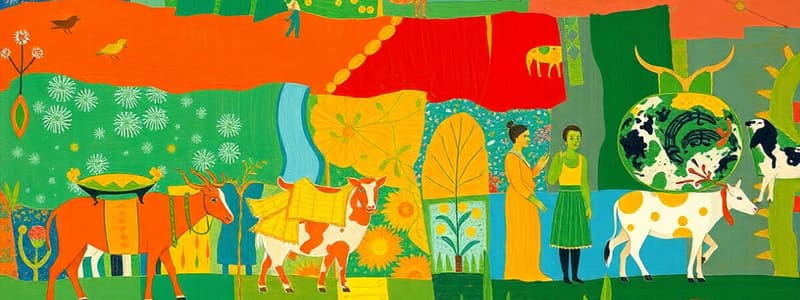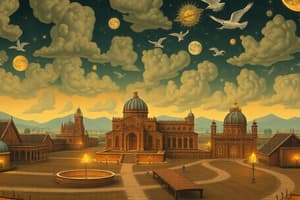Podcast
Questions and Answers
Which crop was not cultivated by the Indus Valley civilization?
Which crop was not cultivated by the Indus Valley civilization?
- Cotton
- Rice (correct)
- Barley
- Wheat
What was the predominant method for the disposal of the dead in the Indus Valley civilization?
What was the predominant method for the disposal of the dead in the Indus Valley civilization?
- Burial in wooden coffins (correct)
- Sky burial
- Mummification
- Cremation in urns
Which of the following materials was NOT used in the production of metal products by the Indus Valley civilization?
Which of the following materials was NOT used in the production of metal products by the Indus Valley civilization?
- Copper
- Iron (correct)
- Bronze
- Lead
Which of the following figures is believed to represent an early form of Lord Shiva?
Which of the following figures is believed to represent an early form of Lord Shiva?
What factor is NOT suggested to have contributed to the decline of the Indus Valley civilization?
What factor is NOT suggested to have contributed to the decline of the Indus Valley civilization?
Which city was known as a dockyard in the Indus Valley civilization?
Which city was known as a dockyard in the Indus Valley civilization?
What type of sculpture was NOT commonly found in the Indus Valley civilization?
What type of sculpture was NOT commonly found in the Indus Valley civilization?
Which of the following statements about the Indus Valley script is accurate?
Which of the following statements about the Indus Valley script is accurate?
What does the term 'Samavartana' refer to in Hindu culture?
What does the term 'Samavartana' refer to in Hindu culture?
Which mountain range is known as the 'abode of snow'?
Which mountain range is known as the 'abode of snow'?
Which of the following is the highest peak in the world?
Which of the following is the highest peak in the world?
What is the significance of the 'Vivaha' ritual in Hinduism?
What is the significance of the 'Vivaha' ritual in Hinduism?
Which range is known for holding the world's second highest peak?
Which range is known for holding the world's second highest peak?
Which river originates from the Himalayan Range?
Which river originates from the Himalayan Range?
What are the Siachen and Biafo glaciers known for?
What are the Siachen and Biafo glaciers known for?
Which of the following ranges is referred to as the Lower Himalayas?
Which of the following ranges is referred to as the Lower Himalayas?
What is the purpose of the jatakarma ceremony?
What is the purpose of the jatakarma ceremony?
When is the Namakarana ritual typically performed?
When is the Namakarana ritual typically performed?
What is the significance of the Annaprasana ceremony?
What is the significance of the Annaprasana ceremony?
What happens during the Vidyarambha Ritual?
What happens during the Vidyarambha Ritual?
What is the main focus of the Upanayana ceremony?
What is the main focus of the Upanayana ceremony?
What does the term Karnavedha refer to?
What does the term Karnavedha refer to?
When is the Upakarma ritual typically held?
When is the Upakarma ritual typically held?
What is the purpose of the Utsarjana ceremony?
What is the purpose of the Utsarjana ceremony?
What type of figures did the Indus Valley civilization produce between 2500 and 1800 BCE?
What type of figures did the Indus Valley civilization produce between 2500 and 1800 BCE?
How old are the Bhimbetka petroglyphs believed to be?
How old are the Bhimbetka petroglyphs believed to be?
What is the significance of the Ajanta Caves?
What is the significance of the Ajanta Caves?
Which cave complex contains both Buddhist and Jain caves alongside Hindu caves?
Which cave complex contains both Buddhist and Jain caves alongside Hindu caves?
During which dynasty were the Khajuraho temples primarily built?
During which dynasty were the Khajuraho temples primarily built?
Which element is common across all the caves located in the Aurangabad district?
Which element is common across all the caves located in the Aurangabad district?
What primarily distinguishes the Elephanta Caves from other cave complexes?
What primarily distinguishes the Elephanta Caves from other cave complexes?
Why are the Khajuraho temples noted for their architectural balance?
Why are the Khajuraho temples noted for their architectural balance?
Which of the following statements is true about the Eastern Mountain Range in India?
Which of the following statements is true about the Eastern Mountain Range in India?
Which river is NOT a source from the Satpura or Vindhaya Range?
Which river is NOT a source from the Satpura or Vindhaya Range?
What is the highest point of the Aravalli Range?
What is the highest point of the Aravalli Range?
Which statement correctly describes the Western Ghats?
Which statement correctly describes the Western Ghats?
Which of the following rivers flow through the Aravalli Range?
Which of the following rivers flow through the Aravalli Range?
Which of the following tourist spots is associated with the Satpura and Vindhaya Range?
Which of the following tourist spots is associated with the Satpura and Vindhaya Range?
What is one characteristic of the Eastern Ghats?
What is one characteristic of the Eastern Ghats?
Which city is located on the southern slope of the Aravalli Range?
Which city is located on the southern slope of the Aravalli Range?
Flashcards are hidden until you start studying
Study Notes
Indus Valley Civilization
- Agriculture was the cornerstone of the economy, with the first civilization cultivating cotton.
- Domesticated animals included sheep, goats, and pigs; major crops were wheat, barley, cotton, ragi, dates, and peas.
- Engaged in trade with the Sumerians; produced metalwork using copper, bronze, tin, lead, gold, and silver.
- Major structures like temples or palaces are absent in archaeological findings, indicating potential simplicity in social organization.
- Worshipped male and female deities, exemplified by the 'Pashupati Seal' featuring a three-eyed figure resembling early depictions of Lord Shiva.
- Excavations revealed fine red pottery with black designs and items made from faience such as beads and bangles.
- Artistic advancements included sculptures, with notable findings like the 'Dancing Girl' statuette from Mohenjodaro, about 4000 years old, and a bearded Priest-King figure.
- Lothal served as a dockyard, showing the civilization’s adeptness in trade and commerce.
- Disposal of the dead was initially through wooden coffins; later practices included cremation in urns.
- The Indus Valley script remains undeciphered.
Major Cities of Indus Valley Civilization
- Mohenjodaro located in Sindh Province (Pakistan).
- Kalibangan situated in Rajasthan.
- Lothal found in Gujarat, also known for its dockyard.
- Surkotada and Banawali are in Gujarat and Haryana, respectively.
- Dholavira, another key city, is located in Gujarat.
Decline of Indus Valley Civilization
- The decline is thought to be gradual rather than abrupt.
- Movements eastward led to city abandonment.
- Theories for decline include the Aryan invasion (Mortimer Wheeler), tectonic movements, floods, river drying, deforestation, and destruction of green cover.
- A combination of factors likely contributed to the civilization's decline rather than a single event.
Indian Fine Arts
- Major forms of art include rock art paintings (pictoglyphs) and carvings (petroglyphs), along with sculptures in bronze and terracotta.
- The earliest known sculptures date back to 2500-1800 BCE, depicting both animals and humans.
- Prehistoric rock art evidence is in Bhimbetka, central India, with carvings believed to be 29,000 years old.
- The Ajanta Caves, a UNESCO World Heritage Site, are significant rock-cut monuments dating from the second century BCE to 480 CE.
- Ellora Caves illustrate religious harmony, consisting of Hindu, Buddhist, and Jain caves, with a total of over 100 excavated.
- Khajuraho temples, built during the Chandella dynasty (950-1050 CE), are known for their architectural and sculptural excellence.
Ceremonial Rituals in Indian Culture
- Jatakarma is the first ceremony held after the birth of a child.
- Namakarana, or the naming ceremony, occurs 11-12 days post-birth to formally acknowledge the child.
- Nishkraman involves taking the child out for the first time after four months.
- Annaprasana marks the child's first food intake, highlighting maternal responsibilities.
- Chudakarana or Mundan is the child's first haircut ceremony.
- Karnavedha pertains to the optional ear-piercing ritual for body ornamentation.
- Vidyarambha formally marks the start of primary education at age 5.
- Upanayana initiates regular education under a Guru.
- Medhajanana invokes divine blessings for mental development and intelligence.
- Upakarma and Utsarjana mark the beginning and end of academic sessions, respectively.
- Samavaj-tana signifies graduation and farewell to the teacher.
- Vivaha is a comprehensive set of marriage rites.
- Antyeshti, or last rites, relate to funeral practices.
Indian Geography
- India features seven major mountain ranges, including the Himalayas, Karakoram, Purvanchal, Satpura, Vindhya, Aravalli, Western Ghats, and Eastern Ghats.
The Himalaya Range
- The highest mountain range, home to Mount Everest (8848m) and vital river origins.
- Serves as a climatic barrier for northern India.
Karakoram Range
- Contains K2 (8611m), the second-highest peak, and significant glaciers such as Siachen and Biafo.
- The Pir Panjal Range is located to the south of the Himalayas.
Purvanchal Range
- An eastern extension of the Himalayas with notable hills like the Khasi and Garo Hills.
- Mawsynram in Meghalaya, part of this range, is the wettest place on Earth.
Satpura and Vindhya Range
- Found in central India, known for tourist attractions and sources of major rivers.
Aravalli Range
- The oldest mountain range in India, featuring tourist spots and important rivers like Banas and Sabarmati.
Western Ghats
- A UNESCO World Heritage Site running from Gujarat to Kanyakumari, rich in biodiversity.
Eastern Ghats
- Running parallel to the Bay of Bengal, important rivers flowing into the Bay include Godavari and Krishna, with key cities like Vishakhapatnam and Bhubaneswar.
Studying That Suits You
Use AI to generate personalized quizzes and flashcards to suit your learning preferences.




